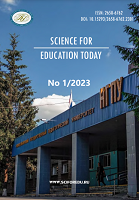Определение условий повышения качества образования в сельских школах с низкими образовательными результатами
Determining conditions for improving the quality of education in rural schools with low educational outcomes
Author(s): Farida F. Gumerova, Lyudmila A. Amirova, Guzel I. Kalimullina, Almaz F. Mustaev, Oksana V. GumerovaSubject(s): School education, Educational Psychology, Rural and urban sociology, Inclusive Education / Inclusion, Sociology of Education, Pedagogy
Published by: Новосибирский государственный педагогический университет
Keywords: Model of improving the quality of education; Quality of education; Monitoring of the quality of education; Rural educational institutions; Conditions for improving quality; High educational outcomes;
Summary/Abstract: Introduction. The authors investigate the problem of improving the quality of teaching and learning in comprehensive schools. The purpose of the study is to determine the conditions for improving the quality of education in rural schools with low educational outcomes. Materials and Methods. The research investigation follows systemic, student-centered, activityoriented and environmental approaches, which are adopted in accordance with the context of the study in the concepts of personalized learning, the development of information and communication culture, open education, interaction and cooperation of a regional pedagogical university with rural and small schools. The research methods used include scientific literature analysis, comparison, concretization, synthesis of conclusions and generalization, empirical research methods, methods of quantitative and qualitative analysis of the results obtained. The developed model is used by the authors as a universal technology for forecasting, planning and solving the problem of cognitive uncertainty. It fulfills a methodological function and is considered as a universal variant of specially organized activities to minimize risks when achieving the desired high educational results in rural educational institutions. Results. The authors summarize the trends and priorities of improving the quality of education in educational institutions based on the analysis of Russian and foreign studies. The authors summarize the ideas about the modeling of teaching and learning processes in the education system. In the course of the study, the authors identify the conditions for a universal variant of the model aimed at improving the quality of education for rural schools with low educational outcomes as a regional management tool. Based on the developed and tested model for improving the quality of education and the results of preliminary comprehensive diagnostics for each educational organization of a single region, the authors determine the most characteristic regional risks using the example of the Republic of Bashkortostan. It is noted that one of the effective mechanisms for improving the quality of education in general education institutions include activities that take into account the specifics and risk of a particular region. Conclusions. The study concludes that the developed model is a conceptual support for building the process of obtaining high educational results in rural schools. The results obtained can be used by local educational authorities of the subjects of the Russian Federation, federal districts of the Russian Federation, and educational institutions to improve the quality of education.
Journal: Science for Education Today
- Issue Year: 13/2023
- Issue No: 1
- Page Range: 85-107
- Page Count: 23
- Language: Russian

